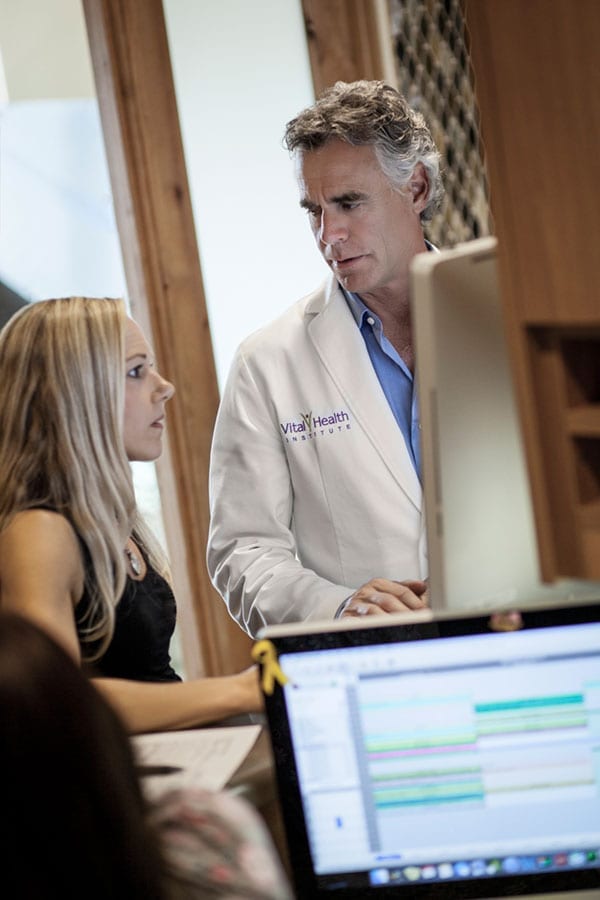Optimal care starts by sitting down and really listening to the patient. Too many doctors fail to listen to what their patients have to say about their own bodies.
-Dr. Cook

If you have endometriosis, finding the right treatment can be confusing and you may be asking many questions such as, “How can my endometriosis best be treated?”, “What are my treatment options?”, “What kind of doctor can provide me with the best endometriosis treatment?” You may have heard conflicting or outright inaccurate information about the treatment options available, everything from simply just taking birth control pills to treat your endometriosis symptoms, all the way to being told you have to get pregnant or have a hysterectomy to treat or cure your endometriosis.
Obviously, the most appropriate treatment will depend on the severity of your endometriosis and the nature of your symptoms (pain and/or infertility) and the presence of other associated health conditions.
Relieving you of your symptoms of endometriosis and restoring your health requires both an extensive knowledge of the condition as well as the experience and expertise needed to offer you the best treatment.
To treat endometriosis we need to know what we are dealing with
The true nature of endometriosis has eluded the medical community for centuries. The cause of the disease remains uncertain; said simply, many different factors (genetic, developmental and environmental) have been implicated in the course and nature of this condition.
So what do we know?
- No two endometriosis patients are alike. Endometriosis varies widely in appearance, location, and severity. The effects of the disease on the body differ between individuals and within the same individual throughout life.
- The effects of endometriosis can be both local (pelvic pain) and systemic (affecting multiple organs and systems throughout the body).
- Endometriosis is frequently accompanied by other gynecological, immunological, and endocrine disorders. As a result, meticulously removing the disease, while an essential step in the journey to recovery, is just one component in a proactive integrative approach to improving your overall health.
Our unique approach utilizes specialized surgery in combination with non-surgical traditional western and integrative treatments to address all aspects of endometriosis and its associated conditions on the body.
Why have my previous treatments failed to help?
Previous treatments may have failed or only partially helped for several reasons:
Surgery was unsuccessful in completely eradicating the disease. This may be due to areas of disease being overlooked, failure to treat areas of disease that overlie delicate or vital structures, and using techniques that only partially destroy the disease. If any endometriosis remains after surgery, the patient’s pelvic pain may persist or recur. Endometriosis surgery is complex and specialized, and requires the expert skill and experience of a surgical specialist.
In many cases, doctors rely on hormone therapy rather than surgery, inducing a state of pseudo-pregnancy or pseudo-menopause in the patient. Hormone therapies are often poorly tolerated due to the significant side effects they produce and may only be partially effective in managing a patient’s pain. They do not make the disease go away, they at best offer palliative care, and they are not suitable for patients struggling with infertility.
Even if a patient has previously undergone the successful surgical removal of her disease and has no remaining endometriosis, she may experience persistent pain and other systemic symptoms. In many patients, the symptoms attributed to endometriosis are in fact multifactorial in origin. Continuing symptoms can result from the secondary effects of endometriosis and its treatment, such as ongoing side effects of previous hormone therapies (e.g. Lupron) or from post-operative adhesions. Another explanation for ongoing pain is the presence of separate (yet sometimes related) health conditions, such as adenomyosis, pudendal neuralgia, interstitial cystitis, pelvic floor dysfunction, vulvar vestibulitis, irritable bowel, allergies and intolerance or sensitivity to certain foods, thyroid dysfunction, fibromyalgia, chronic fatigue, centralized sensitization and neuropathic pain, and the psychological toll of chronic pain. Excellent surgery can remove the disease and bring about relief but may not address the “evil siblings” of endometriosis.
While these are some of the common culprits of treatment failure, there is no cookie cutter answer to this question, which is why a thorough medical history, record review and patient narrative are needed to uncover the possible factors in your continued symptoms.
Combining knowledge with expertise to offer the best treatment
Drawing upon a deep understanding of endometriosis, treatment at Vital Health involves the following key steps:
First, we listen to you and take an acute interest in every aspect of your current health and medical history. This is the only way to truly know why previous treatments have failed and how we can do things differently. During this process, we consider the entire body: pelvic disease and adhesions, fertility, diet and nutrition, allergies, stress, cognition and pain psychology, exercise, co-existing medical conditions, familial risk factors, and exposure to environmental toxins.
The medical history analysis is followed by a thorough physical, pelvic and ultrasound exam to map out any areas of pain, tenderness and/or nodularity, and identify any signs of pelvic and systemic disease.
Based on these findings, we consider possible plans of action. As a patient, your preferences and decisions are integral to your personal treatment plan. We work as a multidisciplinary team to decide which treatments are best for you, with your thoughts and wishes central.
Meticulous surgery to diagnose and carefully remove all endometriosis present can be combined with specialized in-office treatments and therapies tailored to the unique needs of endometriosis patients: pelvic physiotherapy, nutrigenomics and nutritional counseling, pain psychology and psychotherapy, pain management, and gynecologic management and treatment of associated conditions of the uterus, vulva, bowel, bladder, pelvic floor, and pelvic nerves.
For our patients from further afield, we offer many of these specialized services in the form of long-distance consultation and follow-up.
Our care and concern for your health is ongoing. During the first days, weeks and months after surgery, each patient is carefully followed up via in-office and phone consults. Thereafter we invite you to provide yearly feedback on how you are doing and our door always remains open should you require additional treatment or simply a listening ear.
We firmly believe that there is hope for each and every woman with this debilitating disease. Patients have come to us for successful treatment after having had up to 20 previous failed surgeries. There is no such thing as an inoperable or untreatable case of endometriosis; we will not turn you away and we are truly dedicated to doing all we can to restore your health.
Dr. Cook is concentrated on permanent or long-term treatments and approaches to my condition, instead of just throwing medications at my pain and wishing me luck.
-Christina

